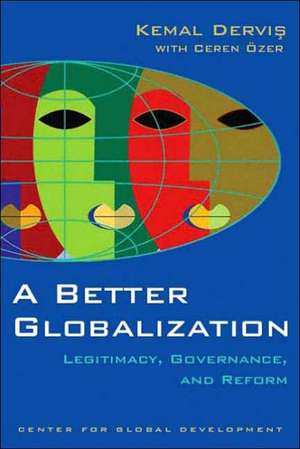A Better Globalization: Legitimacy, Governance, and Reform
Autor Kemal Dervis Cu Ceren Ozeren Limba Engleză Paperback – 4 mar 2005
Preț: 118.27 lei
Preț vechi: 185.09 lei
-36% Nou
22.63€ • 23.69$ • 18.84£
Carte indisponibilă temporar
Specificații
ISBN-10: 0815717636
Pagini: 301
Dimensiuni: 152 x 229 x 23 mm
Greutate: 0.44 kg
Editura: Brookings Institution Press
Colecția Center for Global Development
Locul publicării:United States
Notă biografică
Kemal Dervis was recently named Administrator of the United Nations Development Programme by UN Secretary General Kofi Annan. He will take up the position on August 15, 2005. A member of the Turkish Parliament and former Minister for Economic Affairs, Dervis is recognized as the architect of Turkey's successful economic recovery program. He served for 22 years at the World Bank, where his positions included Vice President for Europe, Middle East and North Africa, and Vice President for Poverty Reduction and Economic Management. He is a member of the Turkish Republic Chamber of Deputies to the European Commission and European Parliament and is a member of the European Constitutional Convention. Ceren Ozer is an Economist with the South Asia Economic Policy Unit of the World Bank.
